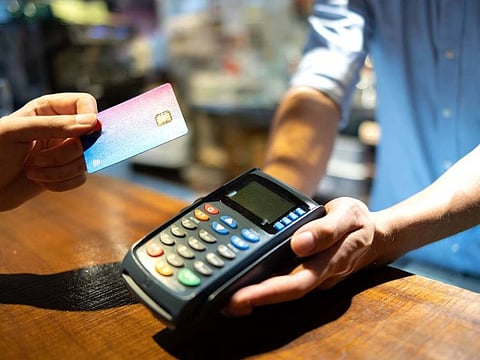Loan payments: When does the bank file a police case in the UAE?
"Will I be stopped at the airport if I have missed a credit card payment?" Find out

Dubai: If you miss your credit card or loan payment in the UAE, not only do you risk receiving uncomfortable calls from collection agents, but you may also be looking at a criminal and civil case filed by your bank or financial institution.
But how does a bank approach the case of payment defaults and after how many missed payments does a case get filed? Here is all you need to know.
When does the bank file a case?
“Whether it is regarding loans or credit card payments, the general practice is that banks file a case after three installments are missed. However, it is important to check the signed agreement with the bank, as that would contain the details of the terms and conditions,” Jihenne Arfaoui, a Dubai-based legal adviser, told Gulf News.
She added that banks follow a step-by-step approach when a customer fails to make the necessary payment for an installment.
“Banks or credit card companies first send a written notice asking for the amount and then they send a legal notice through a notary, after which they can file an execution by cheque in front of the execution court,” she said.
This involves the customer’s file being moved first to the collections department of the bank, which tries to contact the customer to retrieve the dues. If the payment is still not made, the file then moves to the legal department, which begins the legal procedure, according to Arfaoui.
Whether it is regarding loans or credit card payments, the general practice is that banks file a case after three installments are missed. However, it is important to check the signed agreement with the bank, as that would contain the details of the terms and conditions.

“Usually, there is a cheque that is provided as a guarantee by the customer at the time of signing up for the loan or credit card. The bank submits the cheque to recover the amount due to them. In case the customer does not have sufficient funds to honour the cheque, an execution by cheque is filed. The execution decision obligates the customer to pay the bank the required amount. Additionally, the judge decides on imposing a travel ban against the customer until the required amount is fully paid,” she added.
Can I be stopped at the airport if I have missed a credit card payment?
Hari Wadhwana, an Associate at Dubai-based law firm OGH Legal, spoke about when a missed payment might affect your ability to travel.
“Travelling out of the UAE and missing any installment payment to a bank or financial institution have no correlation, whatsoever. It is when the bank files a legal case against the person, that travelling gets affected. It is customary for the bank or financial institution to wait for three defaulted payments before filing any legal case,” Wadhwana said.
He added that once the bank "enforces the security", that is, it presents the security cheque for encashment, if that cheque bounces for insufficient funds, the bank can immediately file a civil execution case against the defaulter. Once the civil execution case is notified to the defaulter, the defaulter has seven days to make the payment. Failing which, the court could impose a travel ban.
Travelling out of the UAE and missing any installment payment to a bank or financial institution have no correlation, whatsoever. It is when the bank files a legal case against the person, that travelling gets affected. It is customary for the bank or financial institution to wait for three defaulted payments before filing any legal case,

“That is when the defaulter cannot travel out of the UAE and the immigration authority will instruct the defaulter to either visit the court or resolve the case with the bank. The defaulter can opt to pay the amount at the court, request the court to deposit the amount in instalments or settle the debt with the bank, in which case the bank would withdraw the said execution case. Once the court case is resolved or withdrawn, the defaulter can then apply with the civil court to lift the travel ban. Once the civil court accepts the application, the defaulter can then travel out of the UAE,” he added.
I’m about to travel but have missed a loan payment. How do I make sure that I won’t be stopped at the airport?
According to Wadhwana, while it is always advisable to first ensure that you have not defaulted on any payments, if you do find yourself in such a situation, first confirm with your bank that the security cheque has not been submitted.
“You can also check with any police station or airport immigration office if there is a travel ban against you,” Wadhwana said.
He also provided a checklist to follow if you are in doubt before you travel:
1. Check bank statements for any cheque presented by the bank or financial institution.
2. If the cheque is presented and dishonoured, get a confirmation from the bank that they have not filed any civil case. Settle the dues as soon as you can.
3. Visit a police station or airport immigration to verify if there is any police case and related travel ban against you.
4. If there are any delays in the payment of installment, keep your bank relationship manager informed. Also, apprise him or her of any change in your payment plans.
This article was first published on June 28, 2021 and has been updated since.
Sign up for the Daily Briefing
Get the latest news and updates straight to your inbox



